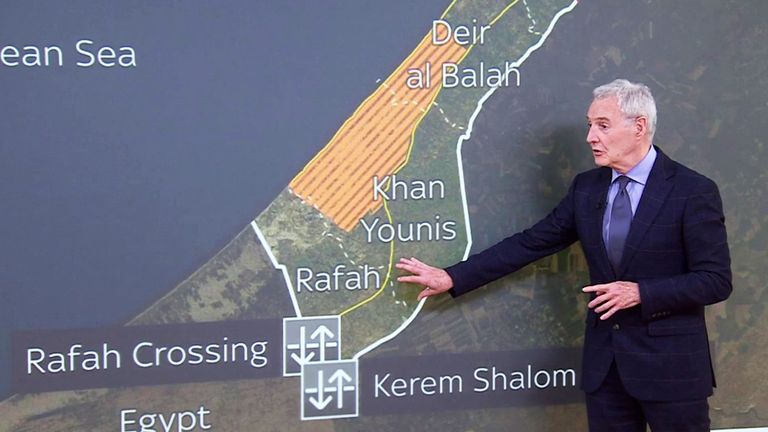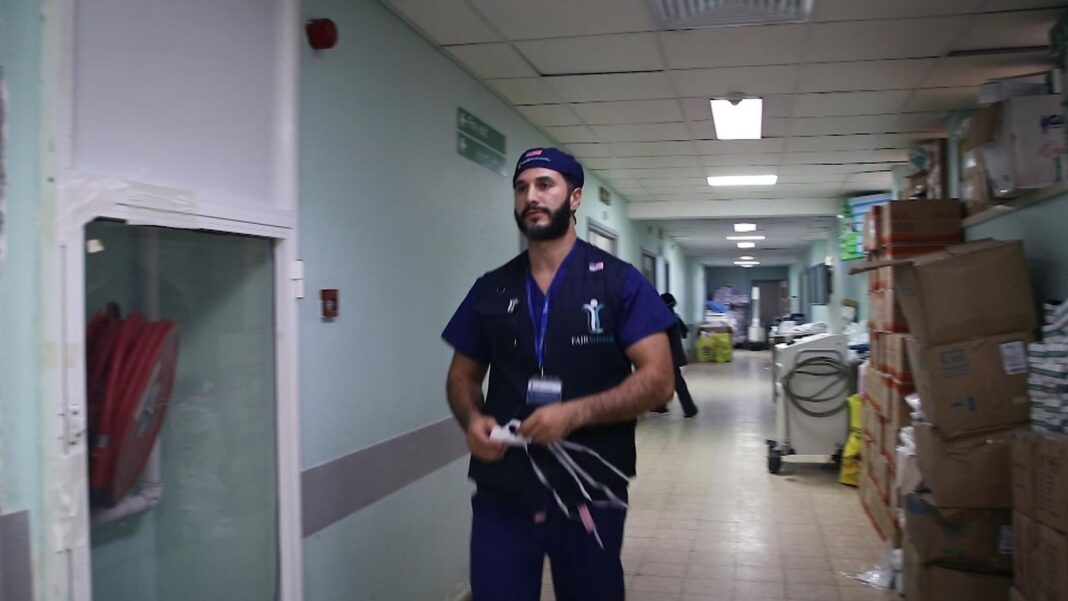The European Hospital, in southern Gaza, is a dangerous place to be.
The facility is the only remaining hospital east of the city of Rafah and an Israeli military operation has come perilously close to its doors.
It was a hazardous time then, for three British medics to begin a short placement, arriving at the hospital just a few days before the Israel Defence Forces (IDF) began its campaign.
Now they are unable to leave.
A patient is treated at the European Hospital
We managed to speak to one of these doctors – an orthopaedic and peripheral nerve surgeon from London called Mohammed Tahir.
He volunteered with a non-profit medical charity called Fajr Scientific and I asked him to describe what he has been seeing.
“In the last few days, with the intensifying of the bombing in Rafah, we are getting many blast injuries here,” he said.
“People literally, their limbs and their bodies torn to shreds. Children with mutilated faces, kids whose limbs we’ve had to amputate because of the complexity of the injuries.”
Gaza latest: Israel’s use of weapons provided by US likely violated international law – report

“When did you arrive? What date did you enter Gaza?” I asked.
“I’ll be honest with you. I mean, right now, night, day, (the) days of the week have all evaporated.
“I work from morning until night, every day. Sometimes I finish at 4am, so I’ve lost track of time. I can’t even remember what day (it is). It was circa around one and a half weeks ago.”
He accepts that he was taking a risk by travelling to Gaza when he did.

“Before coming here, I was warned by several friends, do not go now, because the Rafah invasion is imminent, and you are going over a very dangerous time,” he said.
“But I was anxious, a little bit scared to come, but then I thought if not me, then who?”

Keep up with all the latest news from the UK and around the world by following Sky News
Dr Tahir has dealt with anxiety – but has had to grapple with personal distress.
This is the first time he has worked in a war zone and the nature and intensity of the work has been overwhelming.
The surgeon says he has dealt with 150 cases in the past 10 days.

“(There was) an airstrike, the parents were killed, there were two small children, one of whom we tried to resuscitate, but he was covered in burns from head to toe and we called it, he died,” he said.
“His sister by the side was also covered in wounds, massive wounds to our forehead. Her skull was exposed and she had a skull fracture too.
“And I’m there looking at these two children wondering: ‘What did they do?’.”
Please use Chrome browser for a more accessible video player

4:46
Israel Rafah incursion explained
The staff at the European Hospital do their best to keep people alive – but their workplace has also become a refuge.
“This is a refugee camp,” said Dr Tahir.
“It is a hospital within a refugee camp. You have people, children and women sleeping on floors, in corridors, on stairs, even with makeshift tents inside, tents outside too.”
Read more from Sky News:
UK drops aid into Gaza by parachute
Israeli hostages’ families urge ceasefire
There is a perception that the presence of foreign medical doctors offers a measure of security.
This content is provided by Spreaker, which may be using cookies and other technologies.
To show you this content, we need your permission to use cookies.
You can use the buttons below to amend your preferences to enable Spreaker cookies or to allow those cookies just once.
You can change your settings at any time via the Privacy Options.
Unfortunately we have been unable to verify if you have consented to Spreaker cookies.
To view this content you can use the button below to allow Spreaker cookies for this session only.
Listen above then tap here to follow the Sky News Daily wherever you get your podcasts
“There are a lot of families here looking for shelter because they know outside of the perimeter of this hospital they can be killed,” he said.
“When they see us as people from foreign (medical) missions, they feel that we are, in effect, human shields for them against Israeli airstrikes because we are their protection.
“And when they hear that we have to be evacuated or that there is a whisper (of that), the entire population in the hospital are gripped with fear and panic that they are about to die.”
When I put it to the surgeon that the Israelis have described their operation in southern Gaza as a limited, counter-terrorism operation, he took 4 or 5 seconds to respond.
“What I see on the floor in real life is very different to that.”

People have taken refuge at the hospital

Tents have been set up on the grounds of the facility
One thing Dr Tahir cannot do is leave.
When the IDF captured the Gaza side of the Rafah Crossing on the first day of their operation, they shut down the main humanitarian route in and out of the territory.
I asked the surgeon how he felt about it.
“I feel for my family, not for myself. I know that they are terrified,” he said.
“I know that my friends and family are really concerned for my wellbeing.
“And I think it hurts them more than it hurts me… but the intensity of the feeling that I have because of the tragedies that I am seeing, because of the suffering I’m seeing it.
“I just feel like it cannot stop. I have to keep going and going and going. There is no time to rest, there is no time to sleep. I don’t have that luxury right now.”







